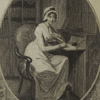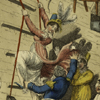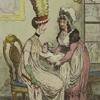Fables for the Female Sex
 An Unfortunate
An Unfortunate
Mother's
Advice
to Her Absent
Daughters
NYPL, Pforzheimer
Collection
 Is Not She a
Spunky
Is Not She a
Spunky
One—or The
Princess
and the
Bishop
NYPL,
Pforzheimer
Collection
 The Fashionable
The Fashionable
Mamma,—or—
The Convenience
of Modern Dress
NYPL, Print Collection
During the Romantic era, women and girls were constantly told:
Be good! This meant being a virgin at marriage and a faithful
wife afterward, with marriage the only socially approved goal.
There was nothing new in this. What
was new in Romantic-era Britain
were gradual changes in the meanings of virtue, sexuality, and
motherhood. Under multiple pressures—conservative panic
at the French Revolution; long wars that aroused both patriotism
and anger; a growing population; and, not least, the industrial
revolution, which made power differences more brutal, even as
it created a new world for consumers—the age-old association
of women with purity and goodness became more firmly entrenched.
"Virtue" came to imply that even the appearance of
impropriety was unacceptable—an innocent walk alone with
a young man was a dangerous undertaking. Conduct books, prints,
novels, preachers, parents, and teachers enforced the idea
that virtue was fragile and irrecoverable if even slightly
damaged. And virtue became politicized: while Mary Wollstonecraft
saw
the
French Revolution as liberating for women, many more heard
in it a call to discipline. Ideas about motherhood also changed:
although birth control was almost unobtainable, conduct books
promoted a new sense that motherhood was a calling, not just
biological
destiny. Breast-feeding became fashionable, then widespread.
Women were expected to instruct their young children in reading,
writing,
arithmetic, and—especially—Christian virtues. But
real life was more difficult, more painful, and more forgiving
than conduct books would have it.



